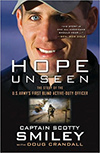THE 4 C’s (Plus 1) of Leadership – it’s people skills that count!
By General (Retired) David McKiernan, Sunday, January 01, 2017
As civilian commercial enterprises and the military increasingly collaborate on discussions of corporate leadership, I have had the opportunity in retirement to join those discussions among a wide variety of business, academic, leader development program, and military venues. While the “mission” objectives may differ – from defeating an adversary to making a financial profit, it is encouraging to see that the private sector is welcoming tactical (the plant) to strategic (the enterprise) leadership thoughts from the military.
That said, I have recently been privileged to speak at the Thayer Leader Development Program, an incredibly rich experience at looking internally at organizational leadership for a wide range of business interests, conducted in the inspirational setting of West Point. My message is simply that, although we are products of different “tribal” cultures, leadership always centers on interpersonal skills and the hard work to share a common vision, professional values, and healthy climate amongpeople.
We are a product of our own experiences, education, and self-development. A long time ago, I was inculcated with leadership principles called the “4 C’s” -- competency, commitment, courage, and candor --which I still argue are the right basic leader values from initial leadership roles to senior positions of authority.
- Competency: being operationally and technically skilled at what the organization does. As one progresses up the leader chain in any organization, competency evolves, and how the whole “system” operates becomes more important than hands-on technical knowledge, but the competency gained early on enables the senior leader to have that respect whenever he or she is on the plant floor.
- Commitment: placing heart and soul into the enterprise, and most importantly, its people. The cautionary note, however, is to keep one’s life in balance (family, personal interests); not running the organization ragged all factor into commitment.
- Courage: the intellectual and moral courage, much more so than physical courage, to simply take the “hard right over the easy wrong.” Finally,
- Candor: always articulating what you, the leader, believe to be truthful. This leadership skill becomes harder and harder the more senior a leader becomes, but at the end of the day, you must be able to look into the mirror and respect what you see.
I add a fifth “C” as leaders become senior in the organization, the idea ofConsistency: projecting consistent leadership, values, and vision even when bad things happen or ambiguity, uncertainty, and friction seem to be the order of the day. People want to see consistency from their leadership – mutual trust and loyalty are the by-products.
One could easily add several other ingredients to this leadership recipe – patience, listening skills, empathy to name a few – but the “4 C’s plus 1” foundation works in any environment where leadership is needed. It’s not “rocket science,” but rather people skills that count!
General David McKiernan
 General David D. McKiernan received his undergraduate degree (BA, European History) from the College of William and Mary, and entered the Army in 1972 with an ROTC commission. He served from platoon leader to numbered Army/Combined Joint Task Force Commander in a wide variety of operational assignments in the United... Read More +
General David D. McKiernan received his undergraduate degree (BA, European History) from the College of William and Mary, and entered the Army in 1972 with an ROTC commission. He served from platoon leader to numbered Army/Combined Joint Task Force Commander in a wide variety of operational assignments in the United... Read More +






